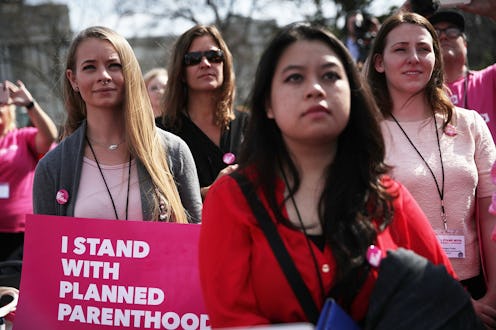
We're talking about Planned Parenthood wrong. I don't mean in the huge amount of support it's getting and everyone who's coming out to say "I stand with Planned Parenthood"— that's great. We need more of that. But when we talk about threats to Planned Parenthood, the language is confusing because 'defunding' Planned Parenthood is really misleading. It makes it sound like the government set up Planned Parenthood and sends it lots of money every month as a paycheck and then they just went totally off-grid and started supporting abortions. That's so, so not the case. And just because the recent Republican attempt to repeal and replace Obamacare failed before it even reached a vote, doesn't mean that the threat to Planned Parenthood is over.
In fact, on Thursday Planned Parenthood organized a Thunderclap asking supporters to #PinkOut profile pictures and share enthusiasm for the cause on social media— because they still need your support.
No matter what language you use, if Planned Parenthood shuts down it would have huge consequences on those who are already the most vulnerable. "Planned Parenthood health centers are really a lifeline for quality healthcare for underserved communities," Destiny Lopez, co-director of pro-choice advocacy group All Above All, tells Bustle. "It’s a little bit of a 'damned if you do, damned if you don’t' moment for these women. because they’re trying to create healthy families that can thrive and yet they’re being put in these situations where health insurance is going to basically become completely out of reach for them because of cost."
But why would it impact these women so much if Planned Parenthood shut down? What is the threat, if not 'defunding'? Well, it all comes down to Medicaid.
The Medicaid Connection
The vast, vast majority of taxpayer money that Planned Parenthood receives is through Medicaid. In fact, recent estimates show that $390 million, or 87 percent of the total paid by government, per the Congressional Budget Office (CBO), comes from Medicaid. So to start using more accurate rhetoric to talk about threats to Planned Parenthood, we need to understand Medicaid — and Medicaid and Planned Parenthood's relationship.
When we talk about 'defunding' what we actually mean is the government not allowing Medicaid to work with Planned Parenthood.
So what is Medicaid? Medicaid is a health insurance program that is funded through state and federal funds. It is aimed at helping vulnerable groups such as the elderly, disabled, and those on low-incomes. Now, just like any insurance, Planned Parenthood performs a service on someone covered by Medicaid and then bills Medicaid for the service. When we talk about 'defunding' what we actually mean is the government not allowing Medicaid to work with Planned Parenthood. Why? Well, seemingly because it performs abortions.
The Abortion Situation
Now, bear in mind that Medicaid and, therefore, government money does reimburse Planned Parenthood for some services — but it doesn't ever pay for abortions. It hasn't since the 1970s, because of the Hyde Amendment. So even though the reimbursements don't happen for abortions, Planned Parenthood critics want to stop all reimbursements for things like STI tests, cervical screenings, birth control, prenatal service and more, just because they do sometimes perform abortions (and according to Planned Parenthood, that's only three percent of the time). And, let me remind you, abortions are a legal and legitimate medical procedure, even if you don't agree with them.
Are Planned Parenthood clinics the only clinics that are covered by these two and would be affected if abortion providers were no longer given federal reimbursements? Absolutely not. But estimates show that one in five women will visit a Planned Parenthood at least once in her life, so you can see how large the impact could be.
It doesn't matter whether or not you support abortion — 'defunding' Planned Parenthood isn't about shutting off the lights and unplugging an abortion clinic. It's preventing the main health insurance provider for low-income and vulnerable women from working with one of the largest women's health care providers, which for a lot of women is the only one available in their area. And it's not OK. Show your support for Planned Parenthood today.